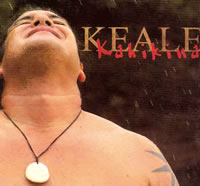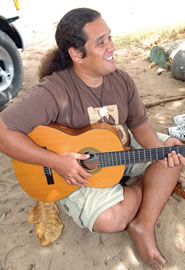Walter Keale - Kahikina
A supernatural encounter following the death of Walter Keale’s uncle, Moe Keale, in 2002 prompted him to try his hand at music.
“The day after Uncle Moe passed away I was at Kailua Beach and he came to the beach,“says Keale.“He came and sat down next to me. They call it a vision, whatever, but I have never had that kind of experience in my entire life. He said to me, ‘I love your music, I love your music.’ I never like say anything because it was strange. I thought to myself, I don’t have any music, what do you mean, Uncle? And he just said, ‘I love your music, no worry I love your music.’ And then he said, ‘You are Keale.’
“And that’s why I decided to play.”
For the past four years, Keale has been engulfed in music, following the path that his cousins Israel Kamakawiwo’ole and Skippy, and uncle Moe Keale have walked before him.
Music, however, wasn’t the road that he planned to take. “I never planned to be a musician,” says Keale. “It wasn’t even on the bottom of my list because I saw what Iz went through and what Uncle Moe went through. It’s a hard life, music. I would much prefer not to, but I had to. It was time.”
The release of Keale’s debut CD, Kahikina, is an expression of who he is and what it means to him to be Hawaiian. It includes 15 tracks, ranging in style from traditional Hawaiian to groovy contemporary.
“I don’t sing to make a hit, I sing because it is connected to my real life existence,” says Keale. “I wanted to make the CD because it said something about the places I’m going, the trails that I’ve taken and the land that I live.”
Keale hopes that his music will be considered Hawaiian, but he expresses that categorizing music is much more black and white than he would prefer.
“There’s some English and groovy stuff that some people might not consider Hawaiian, but my definition of Hawaiian is a much bigger pond than most people would allow to exist,” says Keale.“To me Hawaiian is not a style because every style of Hawaiian music is from somewhere else. Like the guys who say you can’t use that instrument because it’s from New Zealand or whatever. And I tell them, where is the ukulele from? The ukulele is not from here. The guitar is not from here.
“If you want to be really traditional, you going be clicking rocks.”
Q’n A

Kahikina
Who has been most influential with your music?
Skippy. Skippy was so spiritual and his music was so spiritual. I really connect to that way of singing. Uncle Moe was spiritual too, but if we all look back to our family we would have to say Skippy was the most spiritual. So I would have to say him.
What has been the proudest moment in your life?
I think becoming a father. We tried to have kids for nine years and couldn’t.We prayed and prayed and then all of a sudden there she was. It was a planned C-section, so we got up early and I remember hearing the birds that morning.We headed to the hospital and it was like we’re going to have this baby. And as soon as she came into this world, that has to be my most proudest moment. She’s 9 now. Her name is Emma.
What item can you not live without?
My guitar, my ukulele. This bowl. This is my personal organizer. I call it my palm pilot. It has chants I’m learning.It has my journal, my pencil. I keep everything in it and I carry that thing.It’s made of kamani, and kamani is real particular to Kailua. Kailua is known for its kamani trees. And my Hawaiian Bible.

Walter Keale
How much Hawaiian blood do you have?
Half. My mom is full Hawaiian and my dad is from Arkansas. That’s where I get all my freckles from. And then I was raised by Mexicans. That’s why I’m real confused. (laughs)
Can you describe what you were like as a child?
I think as a child I was real kolohe (rascal). I like to have fun and I’m a real people person, so I got into a lot of trouble. I have a million stories.
What makes you unique?
I am a musical renegade.
I would say that’s what I am.I tend to be a renegade. My favorite book in college was called Teaching as a Subversive Activity. To me, that’s what it’s about. Just turning it upside down so they have to think.
If you could just send out one message through your music, what would that be?
Ua Mau Ke Ea O Ka Aina I Ka Pono. That’s it. The land does not breathe when we are not pono.And as long as we are not pono we’ve got to change. We have to really get on with it. It’s all about perpetuating this thing that Ke Akua (God) created.
E-mail this story | Print this page | Comments (0) | Archive | RSS Comments (0) |
Most Recent Comment(s):





 Del.icio.us
Del.icio.us








